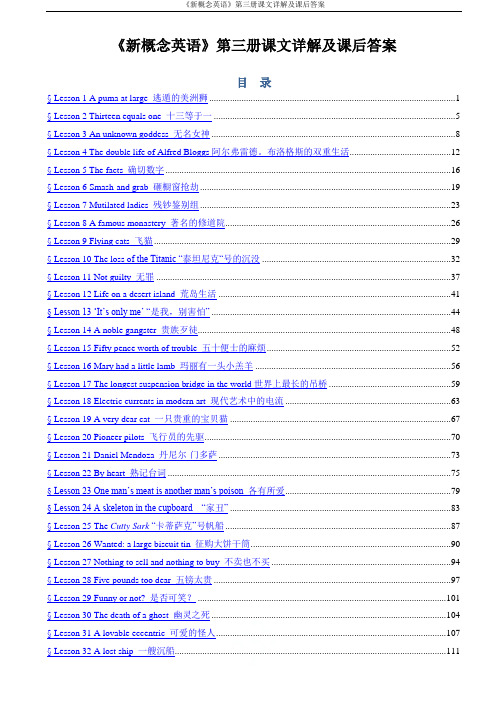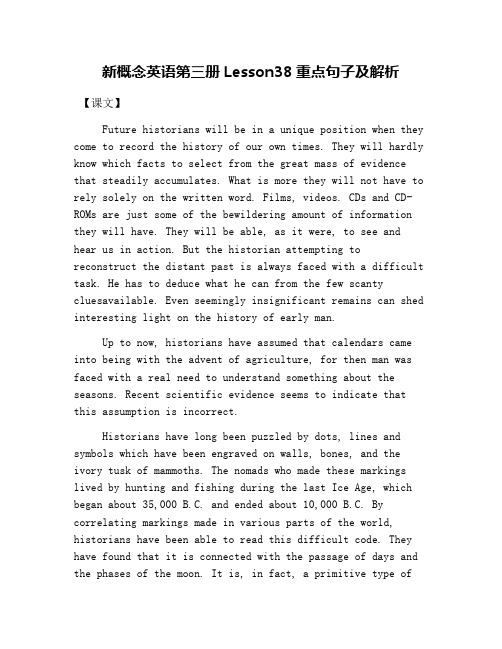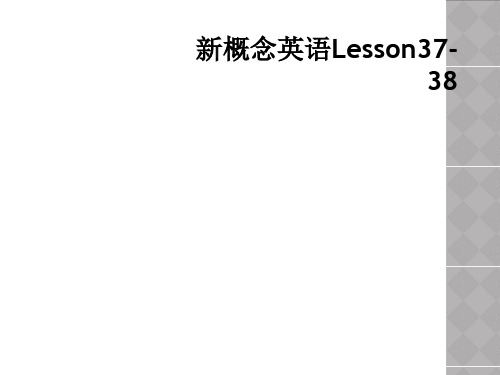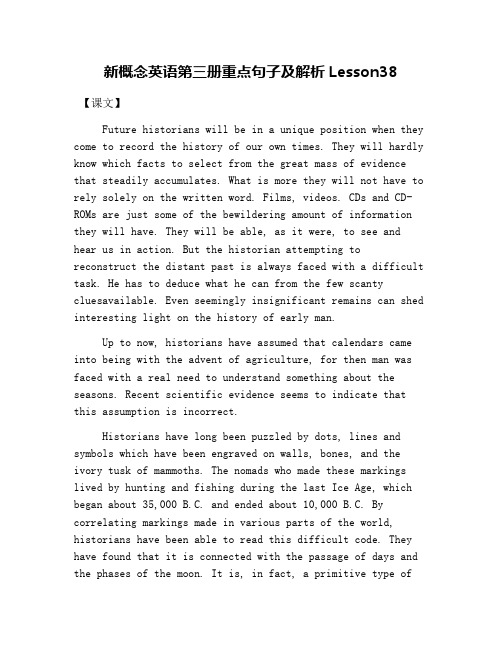新概念三 lesson 38
新概念英语lesson37-38(共32页)8课件

Lesson 38 What are you going to do?
What are you doing?
do her homework She is doing her homework. She is going to do her homework.
listen to music She is listening to music. She is going to listen to music.
work New Words
工作
hard
努力地
bookcase 书架
hammer 锤子
paint
涂
pink
粉红色
favourite 最喜欢的
Listening
Listen to the tape ,and then answer the questions.
1.What is George doing ? 2. What is George going to do ? 3. What colour is George going to
We are not going to play football.
1.我今晚会给你电话。 2. 她会在8点起床。 3. 他们将会煮晚餐。 4. 他将会去银行。 1. I’m going to call you tonight. 2. She is going to get up at 8. 3. They are going to cook dinner. 4. He is going to the bank.
Pair work
practice with your partner by the following sentence patterns:
《新概念英语》第三册课文详解及课后答案

《新概念英语》第三册课文详解及课后答案目录§ Lesson 1 A puma at large 逃遁的美洲狮 (1)§ Lesson 2 Thirteen equals one 十三等于一 (5)§ Lesson 3 An unknown goddess 无名女神 (8)§ Lesson 4 The double life of Alfred Bloggs阿尔弗雷德。
布洛格斯的双重生活 (12)§ Lesson 5 The facts 确切数字 (16)§ Lesson 6 Smash-and grab 砸橱窗抢劫 (19)§ Lesson 7 Mutilated ladies 残钞鉴别组 (23)§ Lesson 8 A famous monastery 著名的修道院 (26)§ Lesson 9 Flying cats 飞猫 (29)§ Lesson 10 The loss o f the Titanic “泰坦尼克“号的沉没 (32)§ Lesson 11 Not guilty 无罪 (37)§ Lesson 12 Life on a desert island 荒岛生活 (41)§ Lesson 13 ‘It’s only me’ “是我,别害怕” (44)§ Lesson 14 A noble gangster 贵族歹徒 (48)§ Lesson 15 Fifty pence worth of trouble 五十便士的麻烦 (52)§ Lesson 16 Mary had a little lamb 玛丽有一头小羔羊 (56)§ Lesson 17 The longest suspension bridge in the world世界上最长的吊桥 (59)§ Lesson 18 Electric currents in modern art 现代艺术中的电流 (63)§ Lesson 19 A very dear cat 一只贵重的宝贝猫 (67)§ Lesson 20 Pioneer pilots 飞行员的先驱 (70)§ Lesson 21 Daniel Mendoza 丹尼尔.门多萨 (73)§ Lesson 22 By heart 熟记台词 (75)§ Lesson 23 One man’s meat is another man’s poison 各有所爱 (79)§ Lesson 24 A skeleton in the cupboard “家丑” (83)§ Lesson 25 The Cutty Sark“卡蒂萨克”号帆船 (87)§ Lesson 26 Wanted: a large biscuit tin 征购大饼干筒 (90)§ Lesson 27 Nothing to sell and nothing to buy 不卖也不买 (94)§ Lesson 28 Five pounds too dear 五镑太贵 (97)§ Lesson 29 Funny or not? 是否可笑? (101)§ Lesson 30 The death of a ghost 幽灵之死 (104)§ Lesson 31 A lovable eccentric 可爱的怪人 (107)§ Lesson 32 A lost ship 一艘沉船 (111)§ Lesson 33 A day to remember 难忘的一天 (114)§ Lesson 34 A happy discovery 幸运的发现 (118)§ Lesson 35 Justice was done 伸张正义 (123)§ Lesson 36 A chance in a million 百万分之一的机遇 (126)§ Lesson 37 The Westhaven Express 开往威斯特海温的快车 (129)§ Lesson 38 The first calender 最早的日历 (132)§ Lesson 39 Nothing to worry about 不必担心 (136)§ Lesson 40 Who’s who 真假难辨 (140)§ Lesson 41 Illusions of pastoral peace 宁静田园生活的遐想 (142)§ Lesson 43 Fully insured 全保险 (149)§ Lesson 44 Speed and comfort 又快捷又舒适 (152)§ Lesson 45 The power of the press 新闻报道的威力 (160)§ Lesson 46 Do it yourself 自己动手 (164)§ Lesson 47 Too high a price? 代价太高 (169)§ Lesson 48 The silent village 沉默的村庄 (174)§ Lesson 49 The ideal servant 理想的仆人 (176)§ Lesson 50 New Year resolutions 新年的决心 (178)§ Lesson 52 Mud is mud 实事求是 (183)§Lesson 53 In the public interest 为了公众的利益 (188)§ Lesson 54 Instinct or cleverness? 是本能还是机智 (192)§ Lesson 58 A spot of bother 一点儿小麻烦 (197)§ Lesson 59 Collecting 收藏 (199)§ Lesson 60 Too early and too late 太早和太晚 (205)§ Lesson 1 A puma at large 逃遁的美洲狮【New words and expressions】生词和短语◆puma n. 美洲狮◆spot v. 看出,发现◆evidence n. 证据◆accumulate v. 积累,积聚◆oblige v. 使…感到必须◆hunt n. 追猎;寻找◆blackberry n. 黑莓◆human being 人类◆corner v. 使走投无路,使陷入困境◆trail n. 一串,一系列◆print n. 印痕◆cling (clung, clung ) v. 粘◆convince v.使…信服◆somehow adv. 不知怎么搞地,不知什么原因◆disturb v. 令人不安学习词汇时仅知道汉语语义是不够的,要把单词放在语句中体会其应用;学习关键句型结构时则要把它放在段落结构或文章里★spot v. 看出,发现pick out / see / recognize / catch sight ofeg: A tall man is easy to spot in the crowd.He has good eye for spotting mistakes. 他有敏锐的识别错误的能力。
新概念英语第三册重点句型解析整合

今天就一起来学习新概念英语第三册重点句型解析,一起来看看吧,下面小编就和大家分享,来欣赏一下吧。
新概念英语第三册Lesson38重点句型解析1、What is more they will not have to rely solely on the written word.what is more 更有甚者,起到承接上下文的作用,是furthermore,moreover 的意思what is worse 更糟糕的是rely on = count on = depend on 依靠、指望-- you can`t rely on others.-- He can`t be relied on / depended on / counted on.solely adv.地整理发布:kaiziliu=only , just , nearly2、They will be able, as it were, to see and hear us in action.in action 行动中的,活动中的as it were 可以说,似乎,好象,是一个插入语,在语法上是一个独立成分,可以用于任何时态语句中。
-- He is as it were a walking dictionary. 他可以说是一本活字典。
-- Computers can never as it were lead independent lives. 电脑不能过独立的生活。
As it is = in fact = in reality = actually = as a matter of fact 事实上-- I thought things would get better,but as it is ,they are getting worse.-- In many ways children live as it were in a different world from the adults.在许多方面,孩子可以说过着一种与大人完全不同的生活。
新概念英语第三册惯用语整理Lesson38

新概念英语第三册惯用语整理Lesson38Lesson 381.accompany vt.陪伴,陪同;为…伴奏accompany sb. while sb. 为某人伴奏(play piano or violin for a singer)A:Can you accompany while I sing?A:我唱歌的时候你能替我伴奏吗?B:I don't play Well, but I will give it a try.B:我弹得不太好,但我要试一试。
2.bone n. 骨头,骨骼chilled to the bone 全身都冻僵了(of a person) very cold; cold in every part of one's body)A:What's the matter? You look worn out.A:怎么回事?你看起来非常疲惫。
B:I walked two hours through the snow and was chilled to the bone.B:我在风雪中走了两个钟头,全身都冻僵了。
3.dot n. 小圆点,似小点之物 v. 加以小点;用点制成on the dot 准时A:Did you and Amanda really meet exactly five minutes to two in front of the theater?A:你和阿曼达是不是真地在剧院前面2点差5分见面的?B:Yes, we were both on the dot.B:是啊,我们两个都准时到达。
4.face v. 面对;面向;朝着(be) faced with 面对,面临 (with a certain problem to handle; confront)例句:For the earliest times people were faced with the problem of sending messages over long distances.从人类早期起,人们就面临着远距离传送信息这个问题。
新概念英语第三册Lesson38重点句子及解析

新概念英语第三册Lesson38重点句子及解析【课文】Future historians will be in a unique position when they come to record the history of our own times. They will hardly know which facts to select from the great mass of evidence that steadily accumulates. What is more they will not have to rely solely on the written word. Films, videos. CDs and CD-ROMs are just some of the bewildering amount of information they will have. They will be able, as it were, to see and hear us in action. But the historian attempting to reconstruct the distant past is always faced with a difficult task. He has to deduce what he can from the few scanty cluesavailable. Even seemingly insignificant remains can shed interesting light on the history of early man.Up to now, historians have assumed that calendars came into being with the advent of agriculture, for then man was faced with a real need to understand something about the seasons. Recent scientific evidence seems to indicate that this assumption is incorrect.Historians have long been puzzled by dots, lines and symbols which have been engraved on walls, bones, and the ivory tusk of mammoths. The nomads who made these markings lived by hunting and fishing during the last Ice Age, which began about 35,000 B.C. and ended about 10,000 B.C. By correlating markings made in various parts of the world, historians have been able to read this difficult code. They have found that it is connected with the passage of days and the phases of the moon. It is, in fact, a primitive type ofcalendar. It has long been known that the hunting scenes depicted on walls were not simply a form of artistic expression. They had a definite meaning, for they were asnear as early man could get to writing. It is possible that there is a definite relation between these paintings and the markings that sometimes accompany them. It seems that man was making a real effort to understand the seasons 20,000 years earlier than has been supposed.【课文翻译】未来的历史学家在写我们这个段历史的时候会别具一格。
新概念英语Lesson37-38

e.g. She’s going to faint! 她要晕倒了!
e.g. The books are going to fall. 书要掉下来了!
make a bookcase e.g. I am going to make a bookcase.
我打算做一个书橱。
cook a meal e.g. She is going to cook a meal.
❖例 ❖我准备回家。 ❖I am going to go home。 ❖他准备刮胡子。
❖He is going to shave. ❖他们准备扫地。
❖They are going to sweep the floor.
❖ 天(将)要下雨了。 ❖ It’s going to rain.
Homework
Which hammer? This one?
Text
Thanks, Dan.
Here you are.
I'm going to paint it.
What are you going to do now, George?
Text
I'm going to paint it pink.
What colour are you going to paint it?
They are not going to work there.
e.g. 他们不打算到那去工作。
She isn’t going to give her new pen to him.
e.g. 她不打算把她的新笔给他。
特殊疑问句
e.g. What are you/we/they going to do? 你(们)/我们/他们要做什么?
新概念英语第三册重点句子及解析Lesson38

新概念英语第三册重点句子及解析Lesson38【课文】Future historians will be in a unique position when they come to record the history of our own times. They will hardly know which facts to select from the great mass of evidence that steadily accumulates. What is more they will not have to rely solely on the written word. Films, videos. CDs and CD-ROMs are just some of the bewildering amount of information they will have. They will be able, as it were, to see and hear us in action. But the historian attempting to reconstruct the distant past is always faced with a difficult task. He has to deduce what he can from the few scanty cluesavailable. Even seemingly insignificant remains can shed interesting light on the history of early man.Up to now, historians have assumed that calendars came into being with the advent of agriculture, for then man was faced with a real need to understand something about the seasons. Recent scientific evidence seems to indicate that this assumption is incorrect.Historians have long been puzzled by dots, lines and symbols which have been engraved on walls, bones, and the ivory tusk of mammoths. The nomads who made these markings lived by hunting and fishing during the last Ice Age, which began about 35,000 B.C. and ended about 10,000 B.C. By correlating markings made in various parts of the world, historians have been able to read this difficult code. They have found that it is connected with the passage of days and the phases of the moon. It is, in fact, a primitive type ofcalendar. It has long been known that the hunting scenes depicted on walls were not simply a form of artistic expression. They had a definite meaning, for they were asnear as early man could get to writing. It is possible that there is a definite relation between these paintings and the markings that sometimes accompany them. It seems that man was making a real effort to understand the seasons 20,000 years earlier than has been supposed.【课文翻译】未来的历史学家在写我们这个段历史的时候会别具一格。
新概念英语第三册精品课件PPT NCE3_lesson38(共12页)

• He has to deduce • what he can (decuce) • from the few scanty clues available. • Even seemingly insignificant remains • can shed interesting light • on the history of early man. • Up to now, • historians have assumed • that calendars • came into being • with the advent of agriculture,
Lesson 38 The first calender
• What is the importance • of the dots, lines, and symbols • engraved on stone, bones and ivory? • Future historians • will be in a unique position • when they come to record • the history of our own times.
• for then • man was faced with • a real need • to understand • something about the seasons. • Recent scientific evidence • seems to indicate • that this assumption • is incorrect.
• They will hardly know • Which facts to select • from the great mass of evidence • that steadily accumulates. • What is more, • they will not have to • rely solely on • the written word. • Films, videos, CDs and CD-ROMs
